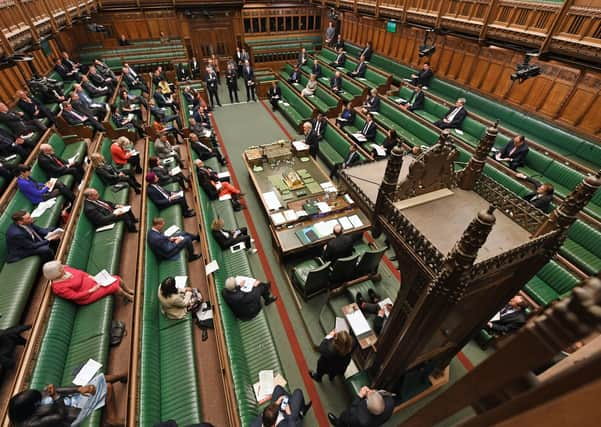Coronavirus Bill must not lead to loss of liberty past generations fought for – Joyce McMillan


As schools close, supermarket shelves are stripped bare, and governments make new emergency announcements by the hour, it’s hardly likely to be the most pressing issue on the minds of most people in the UK today. Yet all the same, some time in the next few days, the Westminster parliament is likely to nod through a piece of legislation, known as the Coronavirus Bill, that will change our system of government and remove some of our key liberties for the next two years, without any provision, as the Bill now stands, for any parliamentary review or scrutiny during that time.
The bill includes the new arrangements for statutory sick pay, and sensible measures to reduce the stringency of usual regulations in areas ranging from the content of school meals to the issuing of death certificates; and it is full of assurances that the powers it contains will only be used, by the UK’s four domestic administrations, as and when they need them.
Advertisement
Hide AdAdvertisement
Hide AdIt also, though, gives the police sweeping powers to arrest and detain suspected coronavirus sufferers, and to stop all public assemblies and gatherings. It extends the validity of warrants under the Investigatory Powers Act of 2016, and relaxes protections for patients being cared for under various mental health acts. It also cancels local elections due to be held in England this spring; and under its powers, it would presumably be a simple matter to ban other pending elections, should the crisis continue into 2021.
Of course, many of these measures are not only defensible but necessary, in the current situation. If there is every argument for introducing emergency legislation at this time, though, there is really no respectable argument for introducing such a bill in a form which deprives parliament of the right to check – say, every six months – that it is working well, and not being abused. On Wednesday night, for example, Portugal introduced a state of emergency, giving its government many of those same crisis powers. The provisions of a constitution written in the 1970s, after Portugal had endured decades of dictatorship, allow an emergency to be declared for just 14 days, before parliament has to approve it again. And although the history of the UK is very different – and most people here would probably allow the government a slightly longer rope – there is something shaming about the idea that the Westminster parliament, with its much-vaunted history as a defender of liberty, might give away important rights for such a long period, perhaps even without the formality of a vote.
And why does it matter, at such a moment of crisis? Because in the end, to deal well with a massive social, economic and personal threat, a society has to know what it is fighting for, and what kind of world it eventually hopes to rebuild. I was born in 1952, in what poet Liz Lochhead once called “the dull country” of “after the war”; and I spent hours, as a teenager, talking to my parents about how it felt to live, and serve in the armed forces, during the Second World War. For years, I cherished my father’s copy of a book called “The British Way And Purpose”, which was used for the civic education of British troops across the world, in the years after 1940. It was a kind of primer on parliamentary democracy and basic civil liberties, and would seem very old-fashioned now. Yet it embodied what that generation thought they were fighting for. It included both respect for the institutions of democracy, and a determination to use them to create a new world where the ideals of human dignity and equality might become more of a reality; where, above all, the economic horrors of the 1930s would never, ever be seen again.
It goes without saying, of course, that the crisis we face now is very different, although the worst-case estimate of possible loss of life in the UK is strikingly similar. Yet it is already becoming clear that we may well, over the next year or more, need the same kind of sense of moving towards a better world, to help us through dark times. In the first place, we can no longer live with the grotesquery of an economic system whose terms are dictated by those whose main activity is shifting money, and which routinely underpays, exploits, and denies economic security to millions of those – be they NHS staff, care workers, or supermarket shelf-stackers – whose work is truly essential to our wellbeing and survival. A rebalancing is long overdue; and any response to this crisis which once again bails out big business while throwing ordinary workers to the wolves, is likely to be met with an explosion of well-justified rage.
In the second place, though, we also need to know that this crisis is not being used to undermine the democratic institutions which are essential to that long-term social progress. Boris Johnson’s Government already has the kind of form on respect for parliament that should give us pause, given its notorious attempt last autumn to shut down parliament to prevent full scrutiny of the EU Withdrawal Bill. And if he and his colleagues want to bring the United Kingdom together at this moment, and to present themselves as a credible and trustworthy national leadership, then surely the last thing they should be doing is trying to bulldoze through an emergency bill that treats parliament as an irrelevance, in direct defiance of what is supposed to be the British constitutional tradition.
For one of the key things the UK learned in the Second World War – and now seems to need to learn again – is that in any long-term crisis, mere patriotism and flag-waving is not enough. The struggle has to be founded on something more substantial than that; that is, on a sense of the shared hopes that make it worthwhile, and on the “way and purpose” of the society that will emerge on the other side, when we are free once again to dance in the streets, and to set about campaigning for a world that reflects the values we have learned to cherish, during the coronavirus time.
Comments
Want to join the conversation? Please or to comment on this article.
